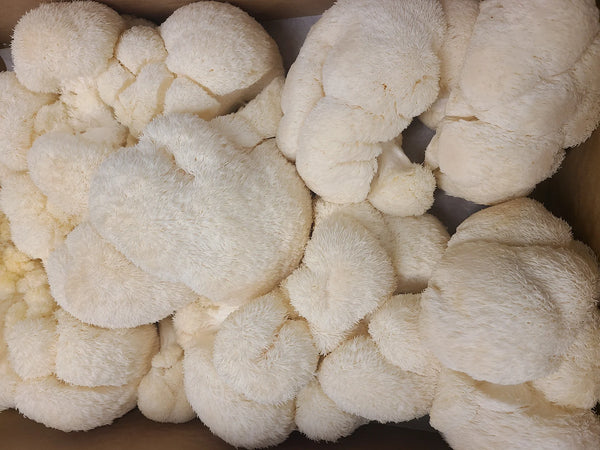Votre panier est vide
FREE SHIPPING $149+ USA & CANADA | EU check out Clive de Carle
FREE SHIPPING $149+ USA & CANADA | EU check out Clive de Carle

Lion’s Mane
octobre 03, 2023 4 lire la lecture
Lion’s Mane (Hericium erinaceus)
Lion’s Mane mushroom, known scientifically as Hericium erinaceus, is an edible basidiomycete fungus, a medicinal mushroom originating from Asia, also abundantly found in North America.
It has been an esteemed ingredient, with a delicate taste and a fish-like consistency, this mushroom has been well used in ancient healing practices across various cultures, which we will explore.
7 Healing Benefits of Lion's Mane
Healthy Digestion - Traditional Chinese Medicine
Lion’s Mane mushroom was primarily used in Traditional Chinese Medicine (TCM) to tonify the spleen and stomach as it has a sweet taste, which indicates that it goes in the spleen, stomach meridians. It is great at promoting healthy digestion and nutrient absorption.
The mushroom was often prepared as a decoction or soup, which was then consumed to alleviate indigestion, gastritis, and ulcers.
From a Western medicine perspective, this mushroom contains a high amount of polysaccharides, which may support a healthy gut microbiome and encourage healthy gut flora.
Wound Healing - Japanese Medicine
Since ancient times, this mushroom has been used to promote wound healing. They would create a topical application from the mushroom’s fruiting body, which was then applied to the affected area to accelerate healing and reduce inflammation.
Some newer Western research suggests that extracts of Lion's Mane mushroom encourages nerve cells to grow and repair more quickly. One study showed that rats with nerve damage receiving a daily extract of Lion's Mane mushrooms had quicker nerve regeneration than control animals.
Promotes Good Sleep - Traditional Chinese Medicine
According to TCM, Lion’s Mane also goes in the heart meridian, hence why it is used by Chinese and Japanese doctors to calm the mind and promote good sleep.
From a Western medicine perspective also, Lion's Mane has been researched and shown to help improve sleep quality without making you drowsy. It is a safe nootropic that works to support sleep by calming the nervous system, reducing anxiety and depression, and boosting mood.
Liver Health - Ayurvedic Medicine
In this line of medicine, Lion’s Mane is known as “Yakrit-Plin Gana” in Sanskrit, and it has also been used to promote overall health and well-being, particularly in supporting liver function and digestion as it possesses hepatoprotective properties.
From a supportive western perspective, Lion's Mane was found to help reduce blood sugars to normal levels while also providing a protective effect on the pancreas, liver, and kidneys.
Fun fact! Lion’s Mane was often prepared as a “ghrita” or herbal ghee in Ayurvedic medicine. They cooked it slowly with ghee (clarified butter) to extract its healing compounds.
Cognitive Health - Japanese Medicine
Similar to its role in TCM and Ayurveda, Lion’s Mane was also used in traditional Japanese medicine to support cognitive function, called vigour at the time. The mushroom was believed to improve memory, focus, and mental clarity.
From a Western perspective, studies have found that Lion’s Mane mushrooms contain two special compounds that can stimulate the growth of brain cells: hericenones and erinacines.
The compounds in this mushroom may help protect against damage caused by Alzheimer’s and dementia disease. This is because of its ability to promote nerve growth and protect the brain by increasing its neuroplasticity.
The Nerve Growth Factor is an insulin-like protein responsible for regulating the brain’s growth, development, and repair. Lion’s Mane mushrooms have 8 classes of compounds well studied for supporting NGF and cognitive function (focus, concentration, damage prevention) that are not in the mycelium including Hericinones, Dilinoleoyl-phosphatidylethanolamine (DLPE), amyloban, amycenone, 3-Hydroxyhericenone F, Hericene, Hericerin, and erinacerin.
Immune Health Boost
From multiple studies, it’s been discovered that Lion’s Mane contains 1,3/1,6 beta-glucans, which are one of the most potent compounds in functional mushrooms for your overall immune health.
These beta-glucans can have a powerful effect in helping your body to return to a balanced level of cholesterol, and support healthy cardiovascular function. They help regulate blood sugar in already healthy levels and also encourage healthy body weight.
Lion’s Mane mushrooms contain over 29 times more 1,3/1,6 beta-glucans compared to mycelium, which is amazing!
Happy Heart - Cardiovascular Health
Lion's Mane mushroom contains a high dose of antioxidants, which may help balance your heart health and decrease oxidative cell damage.
Antioxidants can lower your risk of developing heart disease by discouraging cholesterol from causing blood flow inhibition, and turning bad cholesterol into a good one!
Oxidized cholesterol molecules tend to attach to artery walls, causing them to harden and increase the risk of heart attack and stroke. Reducing oxidation is beneficial for heart health
Lion's Mane mushroom can be your heart's knight in shining armour, supporting your most vital organ if you include it in your daily routine.
Conclusion
Lion's Mane mushroom has been viewed as one of the most important medicinals throughout history, from TCM to Ayurvedic and Japanese medicine, to the vast western studies we explore today in North America.

Canadian Pine Pollen creates their Lion's Mane Tincture 1:4 Dual Extract - Fruiting Body using Canadian cultivated mushrooms due to the relatively short natural growing season, making it challenging to rely solely on wild harvesting. Their proprietary ultrasonic process also ensures the maximum extraction of both water-soluble and alcohol-soluble compounds, resulting in a higher potency and comprehensive extract. The potential immune-boosting, anti-inflammatory, cognitive health, and antioxidant properties, offer a range of health benefits.

LION'S MANE TINCTURE (250MG/ML)
1:4 DUAL EXTRACT - FRUITING BODY (100ML/3.4OZ)
Ingredients: Hericium erinaceus (Fruiting body) 1:4 Dual Extracted Tincture 100ml/33 Servings Per Container
Serving Size 3ML (750 mg Dry - Lion's Mane - 40% Polysaccharides )
Intended Use: Lion’s Mane is used in herbal medicine as an adaptogen to support cognitive health. It is a source of fungal polysaccharides with immunomodulating properties. It provides antioxidants that protect cells against oxidative damage.†
Suggested Use: For adult use only - take 3 ml, 2-3 times per day.
Warning: Consult a physician before taking this product if you are pregnant or breastfeeding.
Other Ingredients: Certified Organic Cane Alcohol (30% ABV), Glycerine, and Spring Water.
Laisser un commentaire
Les commentaires sont approuvés avant leur publication.
Subscribe
Sign up to get the latest on sales, new releases and more …
